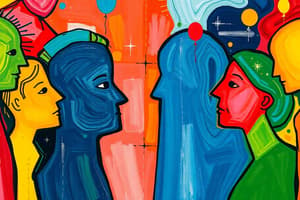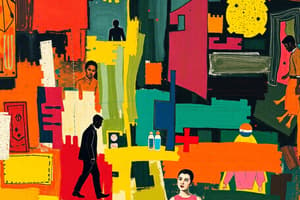Podcast
Questions and Answers
What is the primary function of socialization in society?
What is the primary function of socialization in society?
What distinguishes primary socialization from secondary socialization?
What distinguishes primary socialization from secondary socialization?
Which of the following best describes socialization according to sociologists?
Which of the following best describes socialization according to sociologists?
What role do sociologists believe the social environment plays in individual development?
What role do sociologists believe the social environment plays in individual development?
Signup and view all the answers
What is one common disagreement among sociologists regarding socialization?
What is one common disagreement among sociologists regarding socialization?
Signup and view all the answers
What is the primary role of socialization in society?
What is the primary role of socialization in society?
Signup and view all the answers
How does socialization contribute to the differences in personality among individuals?
How does socialization contribute to the differences in personality among individuals?
Signup and view all the answers
Which statement reflects the relationship between nature and nurture in socialization?
Which statement reflects the relationship between nature and nurture in socialization?
Signup and view all the answers
What reflects the life stages connected through socialization?
What reflects the life stages connected through socialization?
Signup and view all the answers
What impact do cultures and subcultures have on socialization?
What impact do cultures and subcultures have on socialization?
Signup and view all the answers
Which of the following best explains the objective of socialization?
Which of the following best explains the objective of socialization?
Signup and view all the answers
What does socialization help explain regarding the members of society?
What does socialization help explain regarding the members of society?
Signup and view all the answers
What cognitive ability begins to develop in children during the concrete operational stage?
What cognitive ability begins to develop in children during the concrete operational stage?
Signup and view all the answers
In Erikson's psychosocial development stages, what is primarily focused on during Stage 2?
In Erikson's psychosocial development stages, what is primarily focused on during Stage 2?
Signup and view all the answers
What is a key aspect of the formal operational stage of cognitive development?
What is a key aspect of the formal operational stage of cognitive development?
Signup and view all the answers
What outcome might result from failure in Stage 5 of Erikson's psychosocial stages?
What outcome might result from failure in Stage 5 of Erikson's psychosocial stages?
Signup and view all the answers
During which psychosocial stage does the concept of being industrious or feeling inferior develop?
During which psychosocial stage does the concept of being industrious or feeling inferior develop?
Signup and view all the answers
What is the primary purpose of resocialization within a total institution?
What is the primary purpose of resocialization within a total institution?
Signup and view all the answers
Which of the following is NOT an example of a total institution?
Which of the following is NOT an example of a total institution?
Signup and view all the answers
According to Freud, which component of personality is most associated with the pleasure principle?
According to Freud, which component of personality is most associated with the pleasure principle?
Signup and view all the answers
What role does the ego play in Freud's model of personality?
What role does the ego play in Freud's model of personality?
Signup and view all the answers
Resocialization is likely to be most dramatic in which of the following scenarios?
Resocialization is likely to be most dramatic in which of the following scenarios?
Signup and view all the answers
What would happen to individuals without socialization, according to Freud?
What would happen to individuals without socialization, according to Freud?
Signup and view all the answers
In Freud's theory, which aspect of personality represents moral standards and ideals?
In Freud's theory, which aspect of personality represents moral standards and ideals?
Signup and view all the answers
What mechanism does Freud suggest is crucial for forming personality?
What mechanism does Freud suggest is crucial for forming personality?
Signup and view all the answers
How does the environment of a total institution function in relation to resocialization?
How does the environment of a total institution function in relation to resocialization?
Signup and view all the answers
What happens during the process of resocialization?
What happens during the process of resocialization?
Signup and view all the answers
Study Notes
Socialization
- Socialization is the process through which individuals learn to become active members of society and participate in social groupings.
- Interaction is a key element, influencing how individuals behave and respond to one another within their social environment.
- Primary socialization occurs during childhood, where individuals learn the social heritage and culture through their family and immediate social groups.
- Secondary socialization involves later experiences as individuals adapt to new sectors of society, continuing their social development.
Role of Socialization
- Socialization links individual development to societal structures, fulfilling the need for both personal identity and the continuity of culture across generations.
- Variations in socialization experiences arise from different cultural influences, such as race, class, and religion, leading to diverse personalities and social behaviors.
- The interplay of nature and nurture is crucial; most social scientists view both factors as intertwined in shaping human behavior.
Resocialization and Total Institutions
- Resocialization is the process of discarding old behaviors and adopting new ones, especially during significant life transitions.
- Total institutions (e.g., prisons, military, mental hospitals) create controlled environments where individuals can undergo intense resocialization, often involving a break from past identities.
Sigmund Freud
- Freud posited that biological drives are the primary motivation behind human actions, introducing concepts like the id (unconscious desires), ego (rational self), and superego (moral conscience).
- Without socialization, individuals would act out their primal instincts, detracting from organized social life.
- Personality formation occurs through mechanisms such as identification and repression, shaping how individuals relate to societal norms.
Cognitive Development
- Cognitive development in children progresses through stages, starting with concrete operational thinking where logic and cause-effect relationships become understood.
- As they advance into formal operational stages, abstract thinking and the ability to consider hypotheticals develop, enabling complex social interactions such as role taking.
Erik Erikson
- Erikson outlined eight stages of psychosocial development, each marked by a central conflict crucial for personal growth and identity formation.
- Stages include establishing trust/mistrust, developing autonomy, initiative, industry, identity, intimacy versus isolation, generativity, and integrity versus despair.
- The outcome of each stage influences an individual’s ability to navigate future challenges and relationships.
Lawrence Kohlberg
- Kohlberg's research identified six stages of moral development, rooted in Piaget's theories, examining how children learn to make ethical decisions.
- Early moral reasoning is focused on avoiding punishment, evolving in adolescence to align with societal norms and belief in established social orders.
- In later stages, individuals consider community welfare and universal ethical principles, such as justice and individual dignity.
- Kohlberg faced criticism for emphasizing a male-centric perspective in moral development, suggesting that women may not achieve the same moral reasoning stages.
Studying That Suits You
Use AI to generate personalized quizzes and flashcards to suit your learning preferences.
Related Documents
Description
Explore the essential concept of socialization in this quiz. Learn how individuals become members of society and navigate social interactions. This chapter delves into the processes involved in forming social identity and engaging with various social groupings.




